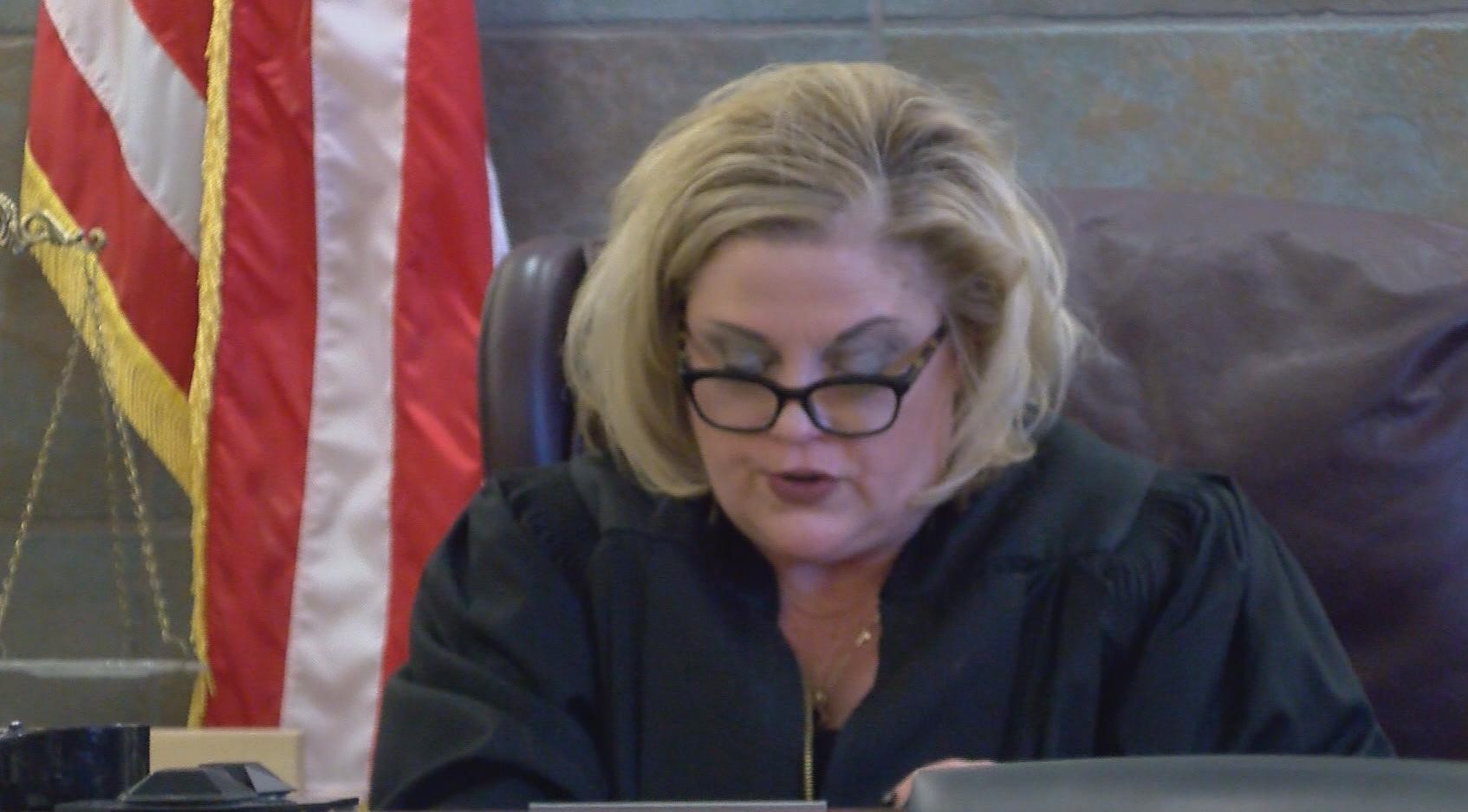Why is Las Vegas Judge Michelle Leavitt still on the bench?
LAS VEGAS — Clark County Nevada Eighth Judicial District Court Judge Michelle Leavitt is under scrutiny again — this time by Attorney Craig Mueller who is representing convicted felon Marlon Brown.
Brown is appealing his conviction of 12 felony counts involving a shooting incident to the Nevada Supreme Court. His defense is arguing at the time of the incident, Brown was suffering from severe PTSD in 2013 as diagnosed by the Department of Veteran’s Affairs. Brown who served in the U.S. Marines did a tour in Afghanistan.
The Baltimore Post-Examiner in our August 5 article, ‘EXCLUSIVE: Las Vegas Grand Jury evidence hints convicted felon ‘Suga’ Shane Valentine is a snitch’, questioned why Leavitt, whose daughter Morgan, according to Judge Melanie Andress-Tobiasson, was allegedly pimped out by convicted felon and long-time pimp Shane Valentine, is scheduled to preside over the murder trial of one of Valentine’s friends, Khari Jabari James.
In 2015, the Nevada Commission on Judicial Discipline issued a public reprimand against Leavitt, for keeping a woman jailed for 10 days on a contempt charge without bail or a hearing in 2012.
According to documents obtained by the Baltimore Post-Examiner, Leavitt admitted she committed violations of the Revised Nevada Code of Judicial Conduct; failure to comply with the law, failure to uphold and apply the law, failure to perform judicial duties competently and diligently, failure to require judicial staff to act in a manner consistent with the judge’s obligation under the Code and failure to be candid and honest with disciplinary agencies.
According to the Stipulation and Order for Public Reprimand that was filed with the Nevada Supreme Court on May 13, 2015, by the Nevada Commission on Judicial Discipline, Leavitt on four separate instances, failed to be honest with the Commission.
It’s amazing that this judge is still sitting on the bench after her credibility and integrity were exposed by the Nevada Commission on Judicial Discipline.
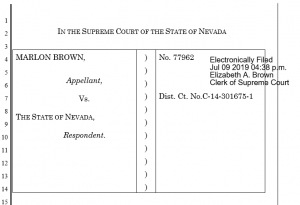 Excerpts from Brown’s Opening Brief for appeal to Nevada Supreme Court filed on July 9, 2019
Excerpts from Brown’s Opening Brief for appeal to Nevada Supreme Court filed on July 9, 2019
This is a direct appeal from a final judgment of conviction in a criminal case that was entered via guilty verdict in the Eighth Judicial District Court of Nevada. The judgment of conviction was entered on December 17, 2018, and a notice of appeal was timely filed on January 16, 2019.
On October 22, 2014, the Appellant, Marlon Brown, was charged via Information with seventeen felony counts.
After a five-day trial that began on March 6, 2018, and ended on March 12, 2018, Marlon was convicted on twelve felony counts. Marlon was sentenced to an aggregate total of five-hundred and forty months in prison with parole eligibility in one-hundred and seventy-six months. Appellant appeals his judgment of conviction.
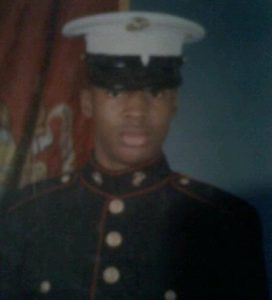
The Appellant, Marlon Brown, is a United States Marine Corps combat veteran diagnosed with Post-Traumatic Stress Disorder (“PTSD”) that is rated at seventy percent disability by the Department of Veteran’s Affairs. According to the Appellant’s psychology expert, Doctor Briana Boyd, who specializes in PTSD, “Mr. Brown was exposed to mortar attacks and incoming enemy fire at the Forward Operating Base, a car bomb, and a fatal helicopter crash,” along with other traumatic events during his service to the United States during time of war that has caused him great distress, mental anguish, anxiety, depression, delusions, and hallucinations that have plagued him upon returning home from service to this country. Marlon has abused alcohol to deal with his PTSD symptoms.
On August 30, 2014, the Las Vegas Metropolitan Police Department was called to respond to a 911 call that a woman, Margaret Aguirre, had been shot two times at the Spectrum Apartments on 9264 West Russell Road, Las Vegas, Nevada. According to Ms. Aguirre her boyfriend, the Appellant, Marlon Brown, came home around 4:00 am after a night of drinking. Initially, Mr. Brown was calm, “everything was okay at first,” and the couple began “just casual conversation” about what they would be doing that day. Ms. Aguirre decided to take a shower as they were casually conversing, starting her normal daily routine “like put lotion on, you know, to get — this is when I start noticing him walking in and out of my master bedroom into the bathroom, and he’s even starting to, like, peek around the bathroom, like around the edge.”
Marlon then began asking Ms. Aguirre strange questions about what she was doing and accusing her of trying to drug him with medications she used for her back. Marlon then began following Ms. Aguirre around her apartment as she was getting dressed. Because of Marlon’s strange, erratic behavior, Ms. Aguirre started to get “very nervous and scared,” and asked Marlon to leave. Eventually, Marlon grabs Ms. Aguirre in an uncontrollable rage, telling her to shut up as he dragged her around the apartment. Marlon grabs a gun from the closet, grabs Ms. Aguirre, and “just starts telling me who the fuck is in here? What the fuck? Why the fuck are they? And it’s just starts dragging me, and we just start going into the kitchen.”
Marlon has slipped into a full dissociative episode “experiencing ‘derealization,’ a dissociative symptom of PTSD where one’s surroundings seem to be unreal, strange, dreamlike, and unfamiliar. The experience of derealization can make PTSD sufferers temporarily lose track of where they are or what is transpiring around them.” Marlon’s “severe derealization symptomology” resulted “in a complete loss of orientation to time, place, person, and situation,” and “Mr. Brown reported experiencing a ‘dream state’ accompanied by visual hallucinations of ‘a clothed silhouette’” that sought to harm him as the events of August 30, 2014, transpired. Ms. Aguirre repeatedly testified that Marlon kept “Asking me where the fuck are they? Tell them to come out. Tell them to come out. Where the fuck are they? I’m trying to answer. It’s just us. He’s getting — this entire time he’s getting madder and madder.”
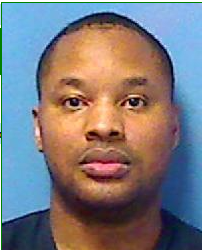
Marlon then began searching the apartment for a phantom enemy combatant, opening “the closet, starts opening all the kitchen cabinets, everywhere, continuously saying, tell them to come out. Where the fuck are they? Where the fuck are they?” Marlon searched room by room in the apartment for a threat to his life from an enemy that was not there, eventually falling to the floor shooting into a closet that he believed the enemy was laying for him in wait. Marlon then shoots Ms. Aguirre in the leg, screaming at her as if she were an enemy combatant: “Where the fuck are they? You think this is a fucking game. Tell them to come out.” Marlon then shoots into the closet three more times, and shoots Ms. Aguirre in the right leg demanding she tell the enemy to reveal themselves. Marlon then threatens to kill Ms. Aguirre and himself if she does not tell him where “they” are hiding, and then flees the scene running from this enemy threat.
Marlon Brown was diagnosed with severe PTSD in 2013 by the Department of Veteran’s Affairs, with insomnia, hyper-vigilance, and thoughts of suicide. Marlon had no prior criminal history of violent behavior. On the date of the incident, Marlon’s PTSD got the better of him, “he became paranoid and erratic. He believed people were in the apartment, specifically the guest bedroom. Brown got so paranoid; he armed himself with a semiautomatic handgun” and began shooting at his hallucinations that he believed were going to harm him.

This was not the first time Marlon had experienced such paranoid delusions. Defense witness Jules Santiago testified that during the time he knew and lived with Marlon he witnessed him “have nightmares, wake up, but he was saying some stuff, you know, like issuing orders, and he was walking around the house like he was in Iraq or Afghanistan.” According to Mr. Santiago, it was “like he was in combat, you know. He was clearing rooms, thinking someone was in the house.” “He would say, they don’t come out. Why don’t they come out? You know, the interpreter is telling them to come out. Why don’t they come out?”
Marlon’s ex-girlfriend, Anna Silva, with whom he has a child, testified that “when he sleeps, he has — it looks like a sleep paralysis where if he forgets to take his medicine he does this thing where he’ll sit straight up, and he lock and loads guns, and he falls back to sleep, sits back up and does that again three, four times.” Ms. Silva also testified that Marlon would frequently “checks in the closets, the bathroom, outside, his cars, stuff like that” for things that are not there.
Prior to trial, Marlon’s attorneys, deputy public defenders, Erika Ballou and Conor Slife, noticed their intent to enter a plea of not guilty by reason of insanity (“NGRI”) and filed a Motion to have a pre-trial ruling on the NGRI jury instruction. The State did not “necessarily have an issue with” the NGRI jury instructions, but only thought the instructions should be “tweaked a little bit.” In fact, attorneys for the State and the Appellant negotiated acceptable jury instructions, including the NGRI jury instruction, and presented them to District Court Judge Michelle Leavitt in chambers prior to trial. Judge Leavitt indicated that she was inclined to permit the stipulated NGRI jury instructions.
On day one of trial, Deputy Public Defender Connor Slife brought the Motion to Approve the NGRI jury instruction because “NGRI is not really a road traveled that much.” The Court noted that “the State did not really have any substantive opposition” to the NGRI jury instruction. The Court noted that the State may have had some issues with the wording of the instructions, “but they really, the substance of your instructions, they really didn’t oppose. They have some suggestions, and they just want to make sure that they would not be deprived of submitting any additional instructions.”
The District Court gave every indication that it intended to permit the unopposed NGRI jury instructions, and that it was only the content of those instructions that would be at issue with the trial concluded. In fact, the Court wanted to make sure that Marlon was apprised that his “defense of not guilty by reason of insanity” was discussed with his lawyers, that he was voluntarily proceeding with the NGRI defense, that he could spend time in a mental institution, “wouldn’t be permitted to come back out into society until the psychiatrist, the evaluators and a Judge determined that it would be appropriate to come back out into society,” and that he could end up with a prolonged sentence possibly longer than if he did not plead that defense.
After Marlon answered all the Judge’s questions about his understanding of the NGRI defense and based on the District Court’s repeated representations that the defense and the jury instruction would be permitted, Marlon’s defense counsel proceeded to anchor his entire criminal defense to his plea of NGRI. Marlon’s defense counsel conceded the sufficiency of all of the evidence and testimony against him, declining to cross-examine the majority of the State’s witnesses. In fact, of the eight witnesses that the State presented, Marlon’s defense counsel cross-examined one, Ms. Aguirre.
Marlon’s defense counsel called four witnesses in their case in chief. Two individuals who testified to their previous experience with Marlon and who had witnessed his prior delusions, Mr. Santiago and Ms. Silva. The defense called Detective Taylor to testify that Ms. Aguirre had told the responding officers that Marlon had used her “as a human shield” as if he were in combat. Finally, Marlon’s defense counsel presented their expert witness, Doctor Briana Boyd, a PTSD expert who testified about Marlon’s PTSD and delusions it caused. Dr. Boyd testified that Marlon’s PTSD caused him to “have a break with reality” on the night of the offense. According to Dr. Boyd, Marlon “was looking for someone,” “bad people,” that simply were not there.
However, after the District Court induced Marlon’s defense counsel into anchoring his entire defense on NGRI, Judge Leavitt abruptly decided, contrary to all her prior representations, that the NGRI jury instruction would not be given. Judge Leavitt’s initial reasoning was that:
“I mean, he used deadly force. Okay. A firearm was used. The facts have to be such that he believed he had — I mean, the facts have to be such that if what he believed was happening, it would truly be justified. I have not heard that. I have not — I mean, I have not heard that, a silhouette, somebody in the closet, the victim was Margaret… Nobody has testified that she was any type of threat to him. So that’s my concern.”
As defense counsel made reasonable explanations for why the NGRI instruction was warranted, Judge Leavitt’s reasoning for denying the instruction began to shift wildly. Judge Leavitt turned her argument against the NGRI instruction to the supposed lack of evidence that Marlon “felt like he was in danger by Margaret, she wasn’t using, nor has he said — no one has said that she was exercising deadly force against him, so the only thing he could do was shoot her to save his life. I mean, that’s a problem you have.” Defense counsel then noted, “If NGRI’s okay for the — for the closet, how does it differ whether he — whether he shoots a person, whether he shoots a closet, whatever he does, it’s — it’s — there’s an inference that he’s doing it because he’s under a delusion and he feels unsafe.”
Judge Leavitt noted that “you know what, the State conceded that they thought you were entitled to an NGRI. I’m not sure I agree. But I’m not sure I see any facts that if his delusion were true, that he would be justified in shooting Margaret.” Defense counsel noted that there was testimony about a struggle for gun with Margaret, and that “If I’m having a flashback I’m in combat, an enemy combatant is struggling over a gun with me, that could be justification to shoot them.”
Judge Leavitt then turned to the idea of self-defense, and the rules of engagement in combat to justify not giving the NGRI jury instruction: “Okay. So if that were true, that it’s okay to shoot someone if you’re struggling over a gun, how does a jury — here’s the thing, what I wanted to know is if this jury needs to be instructed on self-defense. I’m not instructing them on rules of engagement. I don’t know what they are. It doesn’t sound like anyone here knows what they are either. They just want the jury to infer it’s okay to shoot someone when they’re in a delusional state…when they feel unsafe.”
When defense counsel further explained that when clearing a house in a combat situation it would be justified to shoot someone to incapacitate them because they were a threat, or if they were “struggling over the gun.” Judge Leavitt’s reasoning for refusing to advise the jury of the NGRI instruction shifted, asserting that “there is no evidence of the delusion. This is like trying to put on a self-defense case and then not putting a defendant up there to say, I felt threatened, this is what was happening to me, I had no other choice.” However, later during the discussion over presenting the jury with the NGRI jury instruction, Judge Leavitt changed her position, asserting that “Okay. I believe there’s evidence of a delusion. That’s not your problem.” According to Judge Leavitt, “the problem is…. if his delusion was correct. I hate to tell you, there is no evidence of what the delusion was. There’s some inferences that maybe he thought he was in combat. But there is no evidence that his delusion was such that he had no other choice but to shoot Margaret.”
After defense counsel credibly demonstrated to Judge Leavitt that there was significant evidence that Marlon was suffering from a delusion on the night of the incident, Judge Leavitt conceded “you got me on the delusion. I think there’s plenty of evidence that there was a delusion,” but she did not believe there was evidence that the “if the delusion were true, he would be legally justified.” In coming to this justification for denying the NGRI jury instruction, Judge Leavitt determined that the problem was that “Margaret was the one that was shot. That’s the problem. So you have — the delusion has to be such that if that delusion was true, he would be justified in shooting her two times in the legs.”
Defense counsel again reminded Judge Leavitt that there was testimony that there was a perceived struggle for the gun, which would justify Marlon shooting an enemy combatant to incapacitate them. Judge Leavitt then turns to the notion of “deadly force,” and begins to make her own personal conclusions about the rules of engagement in combat that she had previously asserted that she did not have knowledge of:
The Court: And that’s based on what and what evidence is there for the jury to conclude that?
Ms. Ballou: His Marine training.
The Court: Okay. What evidence —
Mr. Slife: May I?
The Court: — is there for the jury to conclude that in combat you can shoot people if they’re — if they’re, I don’t know what you just said. I mean, I think that’s crazy. You can just shoot people if you believe they’re a threat to you, even though they’re not armed, if you want to incapacitate them. I think there are other ways an armed Marine could incapacitate someone — who was unarmed.
Judge Leavitt’s decision to deny the NGRI jury instruction was entirely rooted in her belief that the only way Marlon could present a NGRI defense was if there was some evidence, other than the fact that Marlon shot his girlfriend for no reason while clearly suffering from a delusion that he was in combat, that Margaret was a threat. That is, Judge Leavitt injected her personal belief that during a time of war a soldier cannot shoot a combatant perceived to be a threat because she personally believed “there are other ways an armed Marine could incapacitate someone.”
The jury in this matter was not apprised of the NGRI instruction. Judge Leavitt then precluded Marlon from arguing the insanity defense, and permitted the prosecution to inform the jury that they were not permitted to render a verdict of not guilty by reason of insanity. The jury returned a verdict adjudging Marlon guilty of all twelve counts.
Excerpts of the Summary of the Argument
Marlon Brown appeals his conviction because the District Court, after giving every indication it would allow him to plead not guilty by reason of insanity (“NGRI”), abruptly refused to instruct the jury on NGRI and refused to allow Marlon to argue NGRI, after Marlon’s defense counsel, had conceded all the evidence against him. Marlon suffered from an undisputed delusion on the night of the incident, and the State did not oppose the NGRI instruction. The District Court abused its discretion in denying the NGRI instruction and denied Marlon due process by precluding his counsel from arguing NGRI in closing and instructing the jury they could not enter a verdict of NGRI. Judge Leavitt’s comments at trial, and recent family member’s involvement in a domestic violence incident, which was undisclosed, also evidence that Marlon’s proceedings were tainted with extrajudicial bias. Marlon’s defense counsel was also ineffective by not securing a ruling on the NGRI instruction prior to trial.
Brown’s attorney says trial was tainted by judicial bias
“An opinion formed by a judge on the basis of facts introduced or events occurring in the course of the current proceedings, or of prior proceedings, constitutes a basis for a bias or partiality” challenge when “the opinion displays ‘a deep-seated favoritism or antagonism that would make fair judgment impossible.’”
Essentially, if a judge’s personal opinion or experience, disclosed or undisclosed, affect the proceedings in such a way that would make fair judgment impossible, a conviction should be overturned. “Judicial remarks during the course of a trial that are critical or disapproving of, or even hostile to, counsel, the parties, or their cases, ordinarily do not support a bias or partiality challenge.” However, such remarks “may do so if they reveal an opinion that derives from an extrajudicial source; and they will do so if they reveal such a high degree of favoritism or antagonism as to make fair judgment impossible.”
A judge who fails to disclose that she, or a family member are subject to an investigation and/or prosecution by State may be subject to a challenge of judicial bias.
This evidence of bias based on Judge Leavitt’s comments at trial are further compounded by her failure to disclose that her own daughter had recently been involved in a similar domestic violence incident, which was investigated by the same police department, and prosecuted by the Clark County District Attorney. On June 6, 2018, the Nevada Current reported that Judge Leavitt’s daughter, Morgan Leavitt, had been involved with a pimp in Las Vegas. During a domestic violence trial, Morgan “Leavitt testified…about her nightmarish experience living with [Shane] Valentine and two ‘roommates,’ who Leavitt says beat her while Valentine watched.” The judge that initially presided over the case, Judge Melanie Tobiasson, recused herself because her own daughter was involved with Valentine, a black male adult just like the Appellant.
According to a police memorandum obtained by the Nevada Current, Judge Tobiasson “notified Detective Bluth that Valentine appeared to be the same person who had pimped Judge Leavitt’s daughter, and warned him that pimps were targeting the daughters of judges and police for prostitution.” According to court and police documents obtained by the Nevada Current, Judge Leavitt’s daughter was, indeed, involved in the prostitution ring run by Valentine, and even testified at a domestic violence trial involving Valentine. At the very least, Judge Leavitt should have disclosed that her own daughter was recently involved in a domestic violence case involving the Las Vegas Metropolitan Police Department and prosecuted by the Clark County District Attorney’s office so a proper challenge for bias could be effectively lodged by Marlon’s defense counsel.
It is clear from Judge Leavitt’s comments at trial, and daughter’s recent involvement in a domestic violence case, that she harbored extrajudicial bias that materially prejudiced Marlon’s case. After Judge Leavitt gave every indication that she would allow the NGRI jury instruction stipulated between Marlon’s defense counsel and the State, and Marlon conceded nearly all of the evidence at trial, Judge Leavitt denied Marlon’s the previously stipulated NGRI jury instruction. Judge Leavitt then directed the State to inform the jury they were not permitted to enter a verdict of NGRI, resulting in Marlon effectively conceding that he was guilty of the crimes charged with no actual defense.
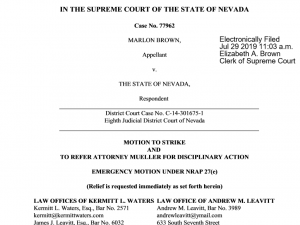 Leavitt’s attorneys file Motion to Strike on July 29, 2019
Leavitt’s attorneys file Motion to Strike on July 29, 2019
This Emergency Motion addresses the sole issue of whether attorney Craig A. Mueller violated Nevada’s ethics rules by personally attacking in Appellant’s Opening Brief the Honorable Michelle Leavitt and her daughter, and whether these personal attacks should be stricken from the public record with attorney Mueller disciplined by this Court or referred to the Nevada State Bar for discipline for his grossly unethical personal attacks on Judge Leavitt and her daughter.
Rather than focus on any alleged legal errors at trial, Attorney Mueller chose to precipitously lodge a gross personal attack on Judge Leavitt and her daughter. Attorney Mueller asserts that Judge Leavitt should have disclosed certain facts, which are blatantly false and defamatory and which Attorney Mueller assumes to be true, including the following:
- that Judge Leavitt’s daughter, [name withheld in this pleading], “had been involved with a pimp in Las Vegas;”
- that an individual named Valentine “had pimped Judge Leavitt’s daughter;” and,
- according to Attorney Mueller’s source, “Judge Leavitt’s daughter was, indeed, in the prostitution ring run by Valentine;”
Attorney Mueller’s sole cited source for this scandalous and blatantly false material is the Nevada Current, an online blog-type website that has no established credibility. To compound this gross misconduct, Attorney Mueller discloses the name of Judge Leavitt’s daughter in his Opening Brief, which he surely knew would be available to the public online.
The only relevance Attorney Mueller could muster up to support citation to this blatantly false and irrelevant information is Judge Leavitt should have disclosed this, because it could have impeded her impartiality in this matter. The purpose of this Emergency Motion is to point out how completely frivolous this argument is, which certainly will be addressed further in the State’s Answering Brief, to request that the argument be stricken from the record, and then to directly address the grossly unethical conduct of attorney Mueller in lodging this false and unwarranted personal attack on Judge Leavitt and her daughter.
Here, there is no doubt whatsoever that the blatantly false and scandalous allegations aimed at Judge Leavitt and her daughter are entirely irrelevant and unrelated to the Brown case and were made for no purpose other than to defame, harass, and embarrass Judge Leavitt and her daughter. Accordingly, all parts of Attorney Mueller’s Opening Brief that include these matters should be stricken from the record on appeal.
Nevada’s ethics rules generally prohibit an attorney from personally attacking a District Court Judge and her daughter, especially where the source of the alleged attacking information is a national enquirer type blog.
Attorney Mueller’s comments have absolutely no relevance whatsoever to the matters pending; they are false, scandalous and clearly frivolous. Therefore, it is respectfully requested that: any reference to Judge Leavitt’s daughter be entirely stricken from the public record, namely, those portions of Attorney Mueller’s Opening Brief at page 46, line 15 through page 48, line 1; and, that attorney Mueller be disciplined by this Court or, at a minimum, referred to the Nevada State Bar for disciplinary action.
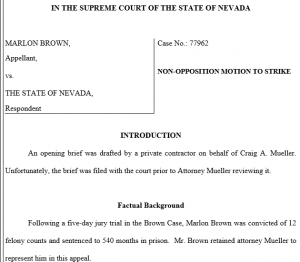 Mueller’s Non-Opposition Motion To Strike filed on August 1, 2019
Mueller’s Non-Opposition Motion To Strike filed on August 1, 2019
An opening brief was drafted by a private contractor on behalf of Craig A. Mueller. Unfortunately, the brief was filed with the court prior to Attorney Mueller reviewing it. Attorney Mueller for his review prior to filing. Unfortunately, one of the first iterations of the brief was submitted with the court prior to be reviewed by Attorney Mueller.
Attorney Mueller has instructed the private contractor to file the revised opening brief, which has been filed today. To that end, Attorney Mueller has corrected the oversight and has already spoken to the private contractor and apologizes to both the court and Judge Leavitt.
Judge Michelle Leavitt excuses herself from Brown case on August 2, 2019
According to Eighth Judicial District Court records, Judge Michelle Leavitt disqualified herself from the Marlon Brown case to avoid the appearance of impropriety and implied bias and ordered that the case be reassigned at random.
Craig Mueller flies amended Opening Brief on August 8, 2019
On August 8, 2019 Marlon Brown’s attorney Craig Mueller, filed an amended Opening Brief with the Nevada Supreme Court and removed all mention of judicial bias relating to Judge Michelle Leavitt’s daughter and anything that had to do with prostitution, Shane Valentine, Judge Melanie Andress-Tobiasson and the Nevada Current.
Judge Melanie Andress-Tobiasson talks about Judge Michelle Leavitt’s daughter
As we reported in our August 5 article Judge Melanie Andress-Tobiasson told the Baltimore Post-Examiner in 2018 during our on-the-record recorded interview with her that Michelle Leavitt’s daughter, Morgan Leavitt Fitzgerald, was pimped out by Valentine.

Tobiasson: This all started about in the summer of 2015. I had a case in front of me where a judge’s daughter was a victim of a brutal beating by two female defendants. It turns out that those two defendants worked for a pimp by the name of Shane Valentine, as did the judge’s daughter. The pimp [Valentine] who was at the scene of the initial beating and was actually directing the girls to inflict the beating on this judge’s daughter, was never charged. One of the two girls whose name was Sophia Faraci, died prior to the preliminary hearing. She was the daughter of a guy by the name of Vinny Faraci. Faraci, his dad or family were enforcers for the Bonanno Crime Family, which was interesting considering his daughter was a prostitute for Shane Valentine, who initially I thought was just some thug. So, we have the preliminary hearing and in the middle of the preliminary hearing, four African American guys come in and sit in the back row and start staring at the judge’s daughter who’s testifying, and I kicked them out of my courtroom and in fact, had them escorted out of the entire courthouse. One of those people was Shane Valentine.
BPE: What was the judge’s name whose daughter was also being pimped out, what was her name?
Tobiasson: Michelle Leavitt.

Leavitt’s daughter testifies about her association with Shane Valentine
According to the transcript obtained by the Baltimore Post-Examiner of the trial that Judge Tobiasson was presiding over, Morgan Leavitt (Fitzgerald) testified that on the day she was assaulted, January 21, 2015, she was in the company of Shane Valentine, Dayonna Walden and Sophia Faraci. Morgan testified that she was living with Shane Valentine at the time. Prior to the assault Morgan testified that Walden, Faraci and her had been in the office of an escort service.
Q. Thank you. Morgan, I’m just going to direct your attention right back to January of 2015. Where were you living around January 20th, 21st, of 2015?
Morgan: I was living in a condo with Shane Valentine, Dayonna Walden and Sophia Faraci. I don’ t know the specific address but it’s the Mosaic Apartments on Sunset and Durango.

Q. When you moved into the apartment who did you live with at first?
Morgan: Sophia and Shane.
Q. You mentioned somebody named Dayonna. Did the person you call Dayonna move in after you?
Morgan: Yeah, about a few days after.
Q. Specifically to January 21st of 2015. Did something occur between yourself, the defendant and Sophia Faraci?
Morgan: Yes.
Q. Where did it start?
Morgan: It started on Wynn and Oquindo at an escort service.
Q. And at that point in the day had you gotten to the escort service?
Morgan: Probably – I don’t know the specific time but I can give an estimate, is that okay?
Q. Yeah, an estimate is good.
Morgan: About 1 or 2 a.m. we made it back to that establishment.
Q. So after midnight?
Morgan: Yes.
Q. And everything that we ‘re about to talk about happened within the same date, correct?
Morgan: Correct.
Q. Okay. So when you get back to the escort service who’s there?
Morgan: Sophia, myself, Dayonna and then the man who operates the business. I don’t know his name though.
Q. Okay. And what occurred there between yourself and Sophia and the defendant?
Morgan: An argument began to happen.
Q. When you say escort service, what kind of a building are we talking about, what kind of area?

Morgan: It’s — I mean, it’s on Wynn and Oquindo right off of Russell and maybe Valley View. There’s not a lot of traffic in that area, it’s kind of like an alley. You go in on Wynn and then you take a right on Oquindo and it’s in a little cul-de-sac. It’s a one-story building. Like it looks like an office building.
Q. Okay. Who is Shane?
Morgan: Shane is — I mean, whose is he to myself? I don’t understand the question. Or who he is?
Q. How do you know Shane?
Morgan: How do I know Shane? I know him from high school. I grew up with him.
Q. Was he your boyfriend?
Morgan: No.
Q. So he just invited you to move in?
Morgan: He sold weed and that’s how we initially came in contact. He was a friend of mine back in high school and we became in contact and that’s how I know him.
Q. Was Shane working as a pimp?
Prosecutor: Objection, relevance.

Judge Tobiasson: Sustained.
Morgan: Do I answer?
Tobiasson: No.
Morgan: I started walking down Wynn at this point towards Russell and I hear a car coming fastly around the corner I’m assuming from the cul-de-sac, and as soon I turned around Sophia was driving the vehicle and Dayonna was in the passenger seat and I couldn’t see what was going on in the car but I saw that they were driving towards me at a very fast rate. And I was on the sidewalk at this point and they came up. Personally I thought I was going to get run over so I jumped out of the sidewalk into the planter and then at that point Sophia had put the car in park and got out and took — well, asked me for my purse and took money out of my purse, cash and the cell phone that was given to me by Shane Valentine. In my purse I had about $600, I had a prepaid Go Phone that was given to me by Shane Valentine and then I had my personal iPad Mini.

Q. Okay. And Sophia was driving, correct?
Morgan: Yes.
Q. Okay. Do you know whose car this was?
Morgan: It was — Shane had rented it. I’m not sure whose name it was under but it was — Shane gave it to us to drive that night.
Morgan: I get into a cab and I didn’t tell him about my situation about what just happened or anything. I had my iPad mini with me actually and I was able to FaceTime and communicate with Shane, kind of telling him what the situation was and saying I was coming to the apartment and you need to pay for this cab ride because Sophia took all of the cash that I had. And he said that that was okay, that I could come to the apartment and he would give me the money for the cab.
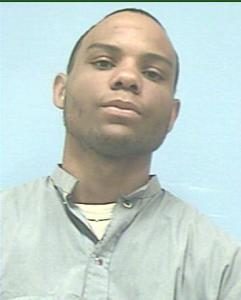
Morgan: Shane had first came out initially and I was thinking he was going, he had cash in his hands, thinking he was just going to give me cash and I was going to be on my way. Dayonna and Sophia proceeded to walk out behind him.
Morgan: Shane is telling me that I have to get out of the car and fight them if I want to have the money for my cab fare. And I said, no, I’m not getting out of the car. I don’t want to get out of the car. And I repeatedly said that over and over again. And then at that point, Sophia had reached into the cab driver’s window and somehow got the door unlocked and Dayonna was on the passenger side at that point opening up the door and pulled me out by my hair. I was held back with my hands behind my back while Sophia hit me repeatedly in my face.
Q. What did Shane do, if anything?
Morgan: Just watched.
Q. So he was there?
Morgan: Yes.
At the time Morgan Leavitt was assaulted, Sophia Faraci was a convicted prostitute stemming from a November 2014 charge of soliciting/engaging in prostitution. Faraci, 20, was killed in a roll-over crash on July 2, 2015 in Las Vegas.
Dayonna Walden was convicted of soliciting/engaging in prostitution in November of 2015.
Michelle Leavitt (Fitzgerald) has no record of prostitution.

Judge Melanie Andress-Tobiasson and her daughter Sarah’s involvement with Marlon Brown and Top Knotch
Tobiasson: About July of 2015, my daughter starts hanging out at a place, in what we call Chinatown here in Las Vegas, it’s called Top Knotch. It was a hip-hop clothing store that when I looked into it, I realized it was not really a clothing store, it was a front for an unlicensed club and also on a regular basis, had young, local high school girls hanging out in the club dancing. There were stripper poles in the back of the club. There was a full bar. There were, at night if you watched the alley behind the club you would see the people come in. You know typical Mercedes, Range Rovers, Bentleys, Rolls Royce, whatever. They would all pull in and you would see the people that were getting out and you could see exactly what was going on. They would go in through the alley back door, and it was, in fact, an unlicensed club.
So, in July of 2015, I start contacting detectives in Vice, asking them about this particular establishment. They tell me they have no knowledge of it whatsoever. I gathered some additional information, find out that the two men who were running this club, both are convicted pimps and one of whom is having a case in front of me. He was a 34-year-old. I take that information to the police, I say listen, these guys have young girls from you know, local high schools hanging out in here every night and from my understanding, they’re entertaining in this unlicensed club. And at one point one of the vice officers apparently walked through there about two o’clock in the afternoon when I can assure you there was no activity going on and reports back to me that it definitely appears to be suspicious. That’s the only thing that was ever done in the entire year and three months or so that I was giving information to vice. They never follow-up, they never do anything else.

My daughter at some point says that she is going to start working there and I tell her, you know, I make it very clear it is not a legitimate business and I make it very clear that she’s risking a lot for our family by hanging out with these kind of people. I’m also in a very precarious position because doing everything I can to keep it so that we have a relationship and I don’t alienate her, so what I do is I allow her to go and work there, but I watch it. I sit, I watch while she’s there and after about three weeks she says she doesn’t want to go back and I tell her; good, don’t go back. But for my understanding even after that, they would hang out there, they would hang out at the club, it was like a hookah lounge slash strip club, so I continue to tell the police this, I watch the back alley, I get license plate numbers, vehicle makes and models, tell them what’s going on, get the information and you know to express my concern repeatedly that there are 30 something-year-old pimps, running this unlicensed club with all these underage girls hanging out in there.
It’s interesting enough the first time that I took the information to the police, I wasn’t so concerned because I figured within a week, the place would be shut down. Well, clearly that didn’t happen because I subsequently learned that not only did the police know about this place when I first started giving them information, they knew about a lot of places like this, and they were kind of untouchable.
There were certain pimps that were untouchable and then there were certain pimps they would go after. The pimps that were untouchable from my understanding is the pimps that would play the game. They would pay the price, they would, you know, offer their girls, and they would get to do whatever they wanted, despite the fact that they were targeting, you know, judge’s daughters, cop’s daughters, etcetera.
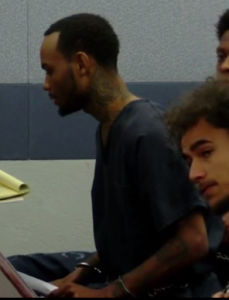
I learned pretty quickly that Shane Valentine was also untouchable, no matter what I said to the police about him, they never went after him. So, this is about September, this goes into September, October 2015, then my daughter quit kind of hanging out there, occasionally she would go there but mostly she wasn’t going there.
December of 2015 I still continued to give information, even when my daughter was no longer going there because I figured it was not only my daughter that was in jeopardy. December 2015 my daughter comes to me and she says to me she met a guy the night before, she went to his house, apparently was sent to him by the people at Top Notch to get a fake ID, or at least by people that she had met at Top Notch. That person was Shane Valentine.
So, September 26 of 2016, it was a Sunday, I get a search warrant call from homicide. About halfway thru the search warrant, we do telephonic search warrants here, about halfway thru the search warrant they give the address and the name of the location of the homicide. That location was Top Notch clothing store. The place that I had started to talk to Vice about, July of 2015. It’s now September 2016. So, Top Notch was still going strong, as an after hours club with underage girls and low and behold there’s a murder there. So, I get off the phone I call the homicide sergeant back and I explained to him that, you know, I was concerned about my name being on the search warrant because these people knew who I was and they had kind of tried to get their hooks into my daughter, but that they had most likely got their hooks into other girls.
At this point in time, Top Notch had moved, when I was first, when my daughter was first aware of it, when I was first aware of it, it was on Spring Mountain, I can get you the full addresses, it was between Valley View and Arville, in what we call Chinatown. By the time it had the murder it had moved to a location at the corner of Flamingo and Decatur, so it was on the southeast corner in a strip mall behind a Blueberry Hill breakfast restaurant and stuff like that. So, the murder happens there.

I contacted Det. Bluth and I’m pissed. I said to him, “I assume you heard about the murder at Top Notch, I’m not quite sure why you have blown me off for all this time, but maybe now I have your attention. I said maybe now since there’s been a murder at Top Notch, and I asked you guys to investigate that a year and a half ago, and you knew what was going on there, I said maybe now you’ll investigate Shane Valentine.
I actually subsequently learned that there were cops who hung out at Top Notch, at the club.
BPE: With the underage girls?
Tobiasson: Uh, huh. If someone would talk to Marlon Brown I’ll bet he would tell them. I actually liked Marlon, Marlon actually protected my daughter, now listen, if my daughter was eighteen, I guarantee he wouldn’t have, but he use to tell my daughter all the time, like I had respect for your mom, she always treated us with respect when we were in the court with her.
BPE: Who is this guy, which guy is this,?
Tobiasson: He was a pimp. He was the one who owned Top Notch, but he had, actually, he wouldn’t let my daughter drink, he wouldn’t let her party, he wouldn’t let her sit back there and smoke the hookahs. He let her hang out there, but according to her, he kind of shielded her from the other stuff. Now, you know, I don’t think the guy deserves any freaking awards, but I do appreciate the fact that he didn’t beat my daughter up and put her out on the Strip. He protected my daughter more than the cops did I can tell you that. That’s pretty sad.
Comment: As I wrote in previous stories I find it utterly appalling that any mother, let alone one who was a sitting judge, would allow their underage daughter to hang out and associate with pimps and criminals in an unlicensed after-hours club that was also frequented by corrupt Las Vegas Metropolitan Police Department officers who were looking for underage girls. If that’s not contributing to the delinquency of a minor I don’t know what is. Absolutely disgusting.

Records indicate that Marlon Brown was the registered owner of Top Knotch
Nevada Secretary of State records confirmed that Brown was the registered agent for Top Knotch Apparel LLC that was located at 230 East Flamingo Road, #204, Las Vegas, NV. 89169. When that location closed Top Knotch Apparel relocated to 4230 S. Decatur Blvd. Las Vegas, NV. 89103.
On September 25, 2016, a man was shot multiple times and died in the parking lot of the strip mall in the vicinity of the Top Knotch Apparel store at the location on Decatur Blvd.
Top Knotch Apparel is no longer in business.
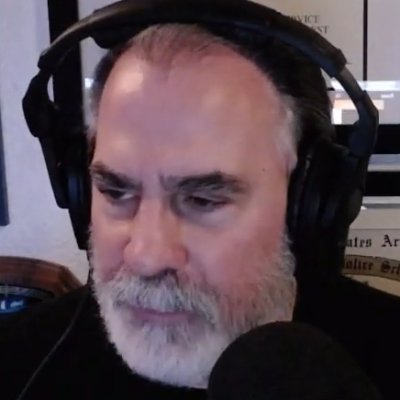
Doug authored over 135 articles on the October 1, 2017, Las Vegas Massacre, more than any other single journalist in the country. He investigates stories on corruption, law enforcement, and crime. Doug is a US Army Military Police Veteran, former police officer, deputy sheriff, and criminal investigator. Doug spent 20 years in the hotel/casino industry as an investigator and then as Director of Security and Surveillance. He also spent a short time with the US Dept. of Homeland Security, Transportation Security Administration. In 1986 Doug was awarded Criminal Investigator of the Year by the Loudoun County Sheriff’s Office in Virginia for his undercover work in narcotics enforcement. In 1991 and 1992 Doug testified in court that a sheriff’s office official and the county prosecutor withheld exculpatory evidence during the 1988 trial of a man accused of the attempted murder of his wife. Doug’s testimony led to a judge’s decision to order the release of the man from prison in 1992 and awarded him a new trial, in which he was later acquitted. As a result of Doug breaking the police “blue wall of silence,” he was fired by the county sheriff. His story was featured on Inside Edition, Current Affair and CBS News’ “Street Stories with Ed Bradley”. In 1992 after losing his job, at the request of the Federal Bureau of Investigation, Doug infiltrated a group of men who were plotting the kidnapping of a Dupont fortune heir and his wife. Doug has been a guest on national television and radio programs speaking on the stories he now writes as an investigative journalist. Catch Doug’s Podcast: @dougpoppa1

